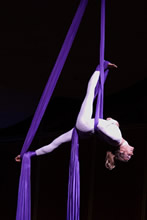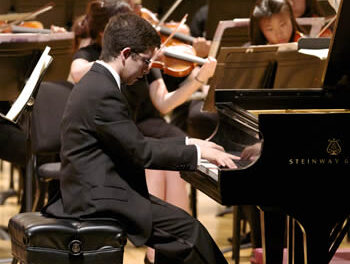An unusually even, strong cast, an alert professional orchestra, and an imaginative tweaking of a traditional staging combined to deliver Opera Carolina‘s dramatic and dynamic performance of Don Giovanni by Wolfgang Amadeus Mozart (1756-91). Mozart provides no cover for musical mistakes and none were heard from either the pit or stage of the Belk Theater. The swift sweep of melodies and action seemed less than the targeted three hours, and was rewarded with a spontaneous and prolonged standing ovation. A longer than usual postlude with the guest conductor and lead singer was unusually informative.
What a pleasure it was to see traditional staging, setting the action in 18th-century Seville, Spain! Suzanne Mess designed appropriate costumes. The sets, designed by Lawrence Shafer, consisted of units that could be quickly moved to suggest a square in Seville, Don Giovanni’s palace, or a graveyard. Lighting was subtly applied by Michael Baumgarten. The staging of Don Giovanni’s going to Hell, his person and soul being attacked by women metamorphosed into Furies, was an imaginative twist by Stage Director Chad Calvert. Having the Don’s demonic laughter over the closing chords was intriguing. What a relief from ham-fisted anachronistic travesties!
Members of the Charlotte Symphony Orchestra delivered alert and stylish playing for guest conductor Robert Lyall, the General and Artistic Director of New Orleans Opera. He kept tight coordination between the pit orchestra and the soloists and chorus on stage. The woodwinds were particularly memorable. The important continuo harpsichord accompaniment of Emily Jarrell Urbanek was restrained and tactful.
The voices of the master-servant pairing were unusually rich and robust, and one can imagine either singer successfully taking up the role of the other. Bass-baritone Kristopher Irmiter said this was his first assumption of the title role of Don Giovanni. His resonant, solid voice easily filled the theater, and he applied refined color to bring out word meanings. Has anyone ever poured more eroticism into “Señorita” as the Don unknowingly tried to seduce Donna Elvira in the second scene of Act I? “Finch’ han dal vino” was given with verve. To provide contrast to his servant’s sound, Irmiter lightened his timbre. The Rock Hill, SC, native was enjoying a reunion with family members from both states. Bass-baritone Stephen Morscheck emphasized the darker color of his fine voice to provide a foil for his Don. Morscheck brought out all the humor of the much put-upon servant. His delivery of the “Catalog Aria” was delightful. Morscheck will sing in Anthony Davis’ opera Amistad with the Spoleto Festival USA 2008 in Charleston, SC.
Soprano Inna Dukach cut a fine figure as the raven-haired beauty, Donna Anna, the victim of Don Giovanni’s rape. Her lower range was firm and her voice was even and seamless as it soared up its range. The power and finesse of her voice was well displayed in the aria “Or sai chi l’onore.” There was enough contrast between Dukach’s tone of voice and that of soprano Caitlin Lynch, who maximized Donna Elvira’s ambivalence toward Don Giovanni. Her voice was also evenly supported across her range. Her singing of “Mi tradì quell alma ingrate” was excellent.
Since the Don should radiate testosterone, the role of Donna Anna’s finance Don Ottavio can come across as a wimp or even worse if the singer is weak. With an even, firm tone and warm vocal quality, tenor Victor Ryan Robertson made a strong case for the formal, legalistic lover. His delivery of “Il mio tesoro intanto“ was emotionally involving and less of a static melodic episode than usual. Opera lovers can hear him in Rossini’s La Cenerentola at this year’s Spoleto Festival USA.
Bright-voiced soprano Malinda Haslett was effective as the too susceptible peasant girl, Zerlina. Her sorely-tried finance, Masetto, was strongly portrayed and sung by baritone Krassen Karagiozov. CVNC has reviewed Karagiozov in many roles, including Don Giovanni, when he was a Fletcher scholar at the North Carolina School of the Arts. Bass Myron Myers brought apt sepulchral eeriness to the role of Donna Anna’s father, the Commendatore. His costume, as an equestrian commander, was outstanding.
Director Chad Calvert, guest conductor Robert Lyall, and the Don Giovanni, Kristopher Irmiter, formed the informal panel for an unusually extended and informative Opera Postlude. Irmiter discussed the challenges of the role, noted he had now sung in all 50 states of the US, and recalled his parents had lived in Burlington, NC. Calvert talked about different ways of handling the Don’s descent to Hell and his reason for adding the Don’s demonic laugh to the closing chords of the opera. Most interesting were Lyall’s comments about the economic realities of staging opera — the bottom line. Opera Carolina General Director James Meena required this production be brought in at three hours, in part for audience reasons but mostly because of union overtime costs. Ottavio’s Act I aria, “Dalla sua pace,” was a major loss among the cuts of recitative, etc.
Lyall said the opening night and this closing matinee came in minutes under the three-hour limit. The middle performance ran 14 seconds over and cost $1000’s extra. Lyall was eloquent about Mozart the composer and opera as an art form.













